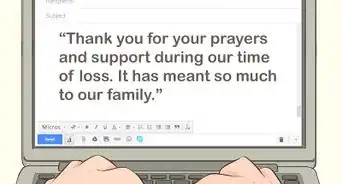This article was co-authored by Ken Breniman, LCSW, C-IAYT. Ken Breniman is a Licensed Clinical Social Worker, Certified Yoga Therapist and Thanatologist based in the San Francisco Bay Area. Ken has over 15 years experience of providing clinical support and community workshops utilizing a dynamic combination of traditional psychotherapy and yoga therapy. He specializes in eclectic non-denominational yoga guidance, grief therapy, complex trauma recovery and mindful mortal skills development. He has a MSW from Washington University in St. Louis and an MA Certification in Thanatology from Marian University of Fond du Lac. He became certified with the International Association of Yoga Therapists after completing his 500 training hours at Yoga Tree in San Francisco and Ananda Seva Mission in Santa Rosa, CA.
wikiHow marks an article as reader-approved once it receives enough positive feedback. In this case, 100% of readers who voted found the article helpful, earning it our reader-approved status.
This article has been viewed 192,036 times.
If someone you know has suffered a loss, then you’ll want to offer your condolences in the most tasteful and helpful way possible. You may be worried that you’ll offend the person by looking like you don't care enough or by coming on too strong. Each situation is unique, but there are a few basic rules that you should follow.
Steps
Offer Condolences in Person
-
1Have the right body language. To show the person that you really care, you should give him 100% of your attention. If the person is grieving, the least you can do is make direct eye contact and face your body toward the person, showing that talking to him is your highest priority. Keep an “open stance” – don’t fold your arms over your chest or turn your shoulders away from the person, or it’ll look like you can’t wait to leave that person. It’s natural to feel a little uncomfortable when offering condolences, but your body language should say that you want to be there.
- Put away all of your distractions. Turn off your phone and don't play with your necklace or look around the room when you talk to the person.
-
2Be sincere. You don't have to be original to be sincere. Just say something like, "I heard what happened to your mom. I'm so sorry for your loss." Don't give the person fake statements or false hope; just show him that you're truly sorry that a terrible thing has happened to him.[1]
- Speak evenly and slowly. Don't make it sound like you're trying to speak as quickly as possible to get it out of the way.
- You can say, "I can't imagine what you're going through." Be honest about the fact that you're very sorry and understand that you can't fully imagine the person's grief.
- If you knew and cared about the person who passed away and the timing is right, you can share a quick story or anecdote that shows how much you loved the person. Or you can say something like, “I wish I could eat another one of her delicious meals” if the person is receptive to discussing the person who passed away.
- The most important thing is just to be present and show the person you care. It's okay if you don't find the perfect words to say.[2]
Advertisement -
3Don't overstep boundaries. If you don't know the person very well, you don't have to look like you're about to cry and give the person a big hug -- unless he looks like he really needs one. If you only have a very professional or casual relationship with the person, you shouldn't make that person uncomfortable by becoming so involved in his private business.
-
4Listen. If the person wants to talk, let him finish. Even if you've prepared a list of the things you want to say, remember that the person is grieving and may just want to talk to someone. Don't try to offer advice or words of comfort -- the best thing that you may be able to do is listen.[3]
- While you're listening, nod while the person is talking and maintain eye contact. If you're close, keep an arm around the person or touch the person in some way to give him comfort.
-
5Don't say anything too cheesy or cliched. Don't say that "Everything will be okay" -- it won't. Or that's at least how the person will be feeling. Though you may have the best intentions, this will make the person feel like his feelings aren't valid and that his grief should not be taken seriously.
- Say what you're feeling instead of what you've heard on TV or read in greeting cards. You can acknowledge that what happened was terrible instead of sugar-coating it.
-
6Don't talk about yourself. If you had a similar experience with a death, you can say, “I lost my father too. We can talk about it if you want.” But don’t go on about your own personal loss—this will make you look more self-involved than sympathetic. No matter what experience you had, you won’t know exactly how that person is feeling at that very moment, so don’t compare that person’s experiences directly to yours.
-
7Give the person a reassuring touch (depending on the situation). If you know the person well, of course you should give him a hug, put your arm around him, or at least give him a reassuring pat if you don’t know him as well. If someone is grieving, then he may just want to be held and you can give the person more comfort this way.
- Just make sure that the person does want to be touched and doesn’t shrink away—some people may feel very vulnerable after a death and don’t want to be touched at all.
-
8Ask if there's anything you can do to help. After you tell the person how sorry you are, ask if there’s anything you can do to help. You should only ask this if you really mean it and do want to help the person. You can offer to do anything, from running small errands for the person, to sleeping over that person’s house if you’re really close.[4]
- Wait for the person to suggest something specific—this may not happen right away.
Offer Condolences to a Variety of People
-
1Offer condolences to your close friend. If you’re offering condolences to your close friend, then you don’t have to worry about overstepping boundaries. With a close friend, you can sincerely give your condolences, hug the person, and watch the person cry and maybe even join in. Just think about how the person reacted in other difficult situations and use this to get a sense of how the person may deal with the death.[5]
- If you know your friend is very emotional, try to give your condolences during a private moment so she can let her emotions out.
- If you know that your friend doesn’t like to be touched, then don’t overwhelm your friend with a big hug.
-
2Offer condolences to your loved one. Giving your condolences to your loved one is tricky. Since you’re comfortable with that person, you should be able to talk about anything, but everyone has a different way of dealing with grief. Just tell the person you love him and that you’re sorry about what happened. Tell him you’ll do absolutely anything for him and hold him for a long time if he wants to be held.[6]
- To offer condolences to someone you love, holding and touching that person is just as important as saying the right thing. Just be there physically for that person.
-
3Offer condolences to your boss. Remember to respect boundaries when you offer condolences to your boss. You can offer them to your boss in person, and even send your boss flowers or a card to show how sorry you are. Just don’t give your boss a big hug unless you have a warm relationship, and remember to give your boss space and to keep things professional.
-
4Offer condolences to an acquaintance. If you know that someone in your neighborhood or office has lost someone and you happen to run into that person, you may want to offer your condolences. This is especially true if that person knows that you know the news. Just say, “I’m really sorry for your loss” and add “let me know if there’s anything I can do for you” if you mean it.[7]
- If it’s a neighbor, you can offer to water that person’s plants if he goes away for the funeral; if it’s a classmate, you can offer to take notes for him while he’s away.
Offer Condolences Through Other Methods
-
1Offer condolences through a card. Offer condolences through a card can make you feel even more at a loss for words than if you were standing in front of the person. But if you take the time to write a brief, thoughtful note, you’ll be helping a friend or close acquaintance in a time of need. Here are some basic things to keep in mind as you offer condolences through a card:
- Don’t use the word “death” or “dead” - say something more tasteful, like “loss” or “passed away”.
- If you knew the person who passed away, you can write a brief memory or anecdote about that person—as long as it’s tasteful.
- Tell the person who suffered the loss that you’re thinking of him and that you are there to help.
-
2Offer condolences over the phone. If you know that someone close to you has suffered the loss of a loved one, then you should communicate your condolences over the phone if that person lives far away. You should call that person to say you’re sorry and sound sincere and talk slowly. Give the person all of your attention over the phone and make sure you’re in a quiet place when you have some time to talk.
- Avoid offering condolences through text. If you have a very casual relationship with that person, and he texts you and mentions the loss, then you can say you’re very sorry through this method. But if you know the person suffered a loss and you’re close, take the time to make a phone call instead of initiating contact through texting, which could offend the person with its casual nature.
-
3Offer condolences on Facebook. Though it may feel strange to give your condolences on Facebook, people now often tell all of their Facebook friends that they’ve suffered the loss of a loved one. This puts you in an awkward position—if the person knows you’re on Facebook a lot and you and the person post on each other’s comments often, then you’re almost being rude by not responding. Here’s how to offer condolences on Facebook:
- If you don’t have a close relationship with the person but do post on his wall or comments from time to time, then simply join the masses of other people who have posted something like, “I’m sorry for your loss.”
- If you’re a bit closer with the person but not close enough for a phone call, you can send the person a private message saying that you saw that the person lost a loved one and that you’re very sorry for the loss.
- Obviously, if someone has posted a status about losing someone and has even written some kind words about the person, do not “like” this status. Even if you just like the sentiment about the person who passed away, this may give the person the wrong message and can be deeply offensive.
Warnings
- Don't offer your condolences by the phone, or by Facebook, Myspace, or any social network if you live near that person and can drive/walk there. It's better to give your condolences face to face than face to phone.⧼thumbs_response⧽
References
- ↑ https://www.funeralwise.com/etiquette/guide/
- ↑ Ken Breniman, LCSW, C-IAYT. Licensed Clinical Social Worker & Certified Yoga Therapist. Expert Interview. 24 April 2020.
- ↑ https://www.funeralwise.com/etiquette/guide/
- ↑ https://www.funeralwise.com/etiquette/guide/
- ↑ https://funeral.com/blog/how-to-express-sympathy-and-offer-condolences/
- ↑ https://everloved.com/articles/funeral-etiquette/when-and-how-to-offer-condolences/
- ↑ https://everloved.com/articles/funeral-etiquette/when-and-how-to-offer-condolences/
About This Article
If you want to offer condolences to someone, but aren’t sure the right way to go about it, begin by giving that person your full attention, turning off your cell phone, and looking them in the eye. It’s ok to just say, “I’m sorry for your loss” if you're at a loss for words. Offer to be a listening ear if the other person wants to talk, but avoid making the conversation all about you and your own losses. You can also offer to help them with whatever they may need, or try giving them a hug or a pat on the shoulder. Read on for appropriate ways to express condolences over the phone or online.



















-Step-20-Version-2.webp)






















-Step-20-Version-2.webp)


































